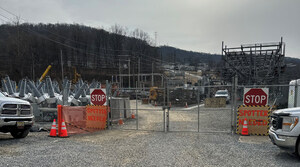Penelec Union Locked Out After Rejecting Last, Best, Final Contract Offer
Company Implementing Plan to Ensure Safe and Reliable Service to Customers
READING, Pa., Nov. 25, 2013 /PRNewswire/ -- FirstEnergy Corp. (NYSE: FE) today declared a lockout of members of Utility Workers Union of America (UWUA) Local 180 at its Pennsylvania Electric Company (Penelec) subsidiary. UWUA Local 180 represents approximately 140 Penelec line, substation, clerks, and meter services employees in the Altoona, Huntingdon, Lewistown, and Shippensburg areas.
The action came after several unsuccessful negotiation sessions between the company and the union. Local 180 members rejected the company's Last, Best, and Final Contract Offer (LBFO) on Sunday, November 24.
"Providing safe and reliable service is a top priority at Penelec as we focus on minimizing any inconvenience our customers might experience as a result of this action," said Dave Karafa, president, Pennsylvania Operations, FirstEnergy. "While a lockout is not something we take lightly at FirstEnergy, we do not believe Local 180 has demonstrated the same level of commitment to reaching an agreement as the company. We were hopeful Local 180 members would ratify this contract proposal, which includes wage increases and benefits similar to other FirstEnergy utility union employees."
The LBFO contained a wage increase of 8 percent over the three-year life of the contract, increases in shift premiums and meal allowances, and additional operational improvements such as a new job classification intended to increase customer service and efficiency.
As part of FirstEnergy's plan to ensure necessary Penelec work continues, employees from other areas of the company who have held line jobs previously or those who have received training will fill positions.
Penelec serves approximately 590,000 customers in 31 Pennsylvania counties.
FirstEnergy is a diversified energy company dedicated to safety, reliability and operational excellence. Its 10 electric distribution companies form one of the nation's largest investor-owned electric systems, serving customers in Ohio, Pennsylvania, New Jersey, West Virginia, Maryland, and New York. Its generation subsidiaries control more than 18,000 megawatts of capacity from a diversified mix of scrubbed coal, non-emitting nuclear, natural gas, hydro, pumped-storage hydro and other renewables. Follow FirstEnergy on Twitter @FirstEnergyCorp.
Forward-Looking Statements: This news release includes forward-looking statements based on information currently available to management. Such statements are subject to certain risks and uncertainties. These statements include declarations regarding management's intents, beliefs and current expectations. These statements typically contain, but are not limited to, the terms "anticipate," "potential," "expect," "will," "intend," "believe," "estimate" and similar words. Forward-looking statements involve estimates, assumptions, known and unknown risks, uncertainties and other factors that may cause actual results, performance or achievements to be materially different from any future results, performance or achievements expressed or implied by such forward-looking statements. Actual results may differ materially due to the speed and nature of increased competition in the electric utility industry, in general, and the retail sales market in particular; the impact of the regulatory process on the pending matters before the Federal Energy Regulatory Commission and in the various states in which we do business including, but not limited to, matters related to rates and pending rate cases; the uncertainties of various cost recovery and cost allocation issues resulting from American Transmission Systems, Incorporated's realignment into PJM Interconnection LLC; economic or weather conditions affecting future sales and margins; regulatory outcomes associated with storm restoration, including but not limited to Hurricane Sandy, Hurricane Irene and the October snowstorm of 2011; changing energy, capacity and commodity market prices including, but not limited to, coal, natural gas and oil, and availability and their impact on retail margins; the continued ability of our regulated utilities to recover their costs; costs being higher than anticipated and the success of our policies to control costs and to mitigate low energy, capacity and market prices; other legislative and regulatory changes, and revised environmental requirements, including possible greenhouse gas emission, water discharge, water intake and coal combustion residual regulations, the potential impacts of Cross-State Air Pollution Rule, Clean Air Interstate Rule (CAIR), and/or any laws, rules or regulations that ultimately replace CAIR, and the effects of the United States Environmental Protection Agency's Mercury and Air Toxics Standards rules including our estimated costs of compliance; the uncertainty of the timing and amounts of the capital expenditures that may arise in connection with any litigation, including New Source Review litigation or potential regulatory initiatives or rulemakings (including that such expenditures could result in our decision to deactivate or idle certain generating units); the uncertainties associated with the deactivation of certain older regulated and competitive fossil units including the impact on vendor commitments, and the timing thereof as they relate to, among other things, Reliability Must-Run arrangements and the reliability of the transmission grid; adverse regulatory or legal decisions and outcomes with respect to our nuclear operations (including, but not limited to the revocation or non-renewal of necessary licenses, approvals or operating permits by the Nuclear Regulatory Commission or as a result of the incident at Japan's Fukushima Daiichi Nuclear Plant); issues arising from the indications of cracking in the shield building at Davis-Besse; the impact of future changes to the operational status or availability of our generating units; the risks and uncertainties associated with litigation, arbitration, mediation and like proceedings, including, but not limited to, any such proceedings related to vendor commitments; replacement power costs being higher than anticipated or not fully hedged; the ability to comply with applicable state and federal reliability standards and energy efficiency and peak demand reduction mandates; changes in customers' demand for power, including but not limited to, changes resulting from the implementation of state and federal energy efficiency and peak demand reduction mandates; the ability to accomplish or realize anticipated benefits from strategic and financial goals including, but not limited to, the ability to reduce costs and to successfully complete our announced financial plans designed to improve our credit metrics and strengthen our balance sheet, including but not limited to, proposed capital raising and debt reduction initiatives, and the proposed sale of non-core hydro assets; our ability to improve electric commodity margins and the impact of, among other factors, the increased cost of fuel and fuel transportation on such margins; the ability to experience growth in the Regulated Distribution and Regulated Transmission segments and to continue to successfully implement our direct retail sales strategy in the Competitive Energy Services segment; changing market conditions that could affect the measurement of liabilities and the value of assets held in our Nuclear Decommissioning Trusts, pension trusts and other trust funds, and cause us and our subsidiaries to make additional contributions sooner, or in amounts that are larger than currently anticipated; the impact of changes to material accounting policies; the ability to access the public securities and other capital and credit markets in accordance with our announced financial plan, the cost of such capital and overall condition of the capital and credit markets affecting us and our subsidiaries; actions that may be taken by credit rating agencies that could negatively affect us and our subsidiaries' access to financing, increase the costs thereof, and increase requirements to post additional collateral to support outstanding commodity positions, letters of credit and other financial guarantees; changes in national and regional economic conditions affecting us, our subsidiaries and our major industrial and commercial customers, and other counterparties including fuel suppliers, with which we do business; issues concerning the stability of domestic and foreign financial institutions and counterparties with which we do business; the risks and other factors discussed from time to time in our United States Securities and Exchange Commission filings, and other similar factors. The foregoing review of factors should not be construed as exhaustive. New factors emerge from time to time, and it is not possible for management to predict all such factors, nor assess the impact of any such factor on FirstEnergy's business or the extent to which any factor, or combination of factors, may cause results to differ materially from those contained in any forward-looking statements. FirstEnergy expressly disclaims any current intention to update, except as required by law, any forward-looking statements contained herein as a result of new information, future events or otherwise.
SOURCE FirstEnergy Corp.
WANT YOUR COMPANY'S NEWS FEATURED ON PRNEWSWIRE.COM?
Newsrooms &
Influencers
Digital Media
Outlets
Journalists
Opted In






Share this article